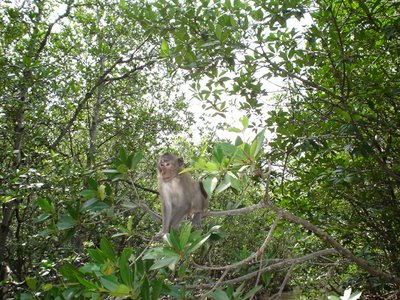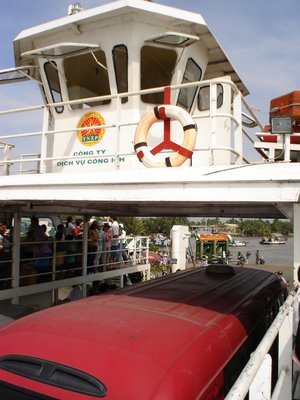
I have just completed my second week of Vietnamese lessons and love it! My teacher, an ex-high school literature and language teacher, comes to my house three times a week for an hour and a half. It seems all my active listening to the language has really helped. All of the words and tones are familiar, and I do fairly well at reproducing them. And even the impossible ng is now somewhat within my grasp.
We pronounce it all wrong. I had many Vietnamese students in the US with the last name Nguyen, which was always pronounced new-yen. Sorry, that is so far off the mark that I doubt any Vietnamese would recognize it. It sounds more like wing to my ears. The language books all say that the ng in Vietnamese is the same sound as the final ng in sing. Ha! It is not. And even if it were, it is not possible to do at the front of a word. But the good news is that I am actually making progress. Or at least when I speak very slowly.
Another problem is the accent. There are three different accents here; the one from Hanoi in the north, a central one, and the southern, HCMC accent. Seeing that I live here, it would make sense to learn that accent. However, it seems that the Hanoi accent is the ‘correct’ one and that is what my instructor is teaching me. This did concern me a bit until I thought about all those students that I have taught who have to learn my American accent on Monday, and an Australian accent on Wednesday, followed by an Irish one on Friday. I have no cause for complaint.
Many people have told me that it took them forever to hear the tones in the language. I, fortunately, have never had that problem. I could differentiate between them from day one in the country. That does not mean that I can remember which words go which way at all times if I am not reading it. I have found that it is like singing, and that I remember sentences as a melody in a song. Class is like singing a call-and-respond song. Tons of fun.
I am trying not to get too cocky about it all. After all, I can only say ‘my name is’, where do you work?’, ‘where do you live?’, and a few other basics. Nevertheless, I am finding that I can pick words out of conversations. Also, I have finally learned to count. I am very embarrassed that it has taken me eight months to get around to learning the numbers, yet I got them all after one lesson. I still think the reason that it was so easy is that every time I am in a taxi I listen to the dispatch chatter which is mostly street numbers.
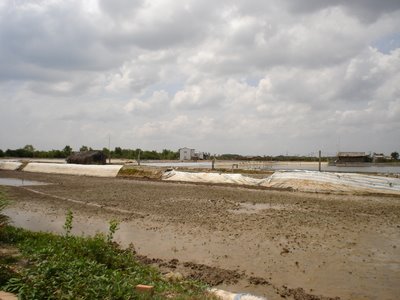
My teacher is from a school that runs both small classes and privates. They teach a lot of the diplomatic corps and business people. Last Saturday, they arranged a field trip for all interested students. It meant getting out of the house at 7am, but I was up for another adventure.
Our group consisted of about fifteen students and four teachers, including mine.
We went to a place called Can Gio. You get there by driving for thirty minutes, then board a car ferry to take you across the river. On the trip, we were scheduled to visit shrimp farmers and a mangrove forest.
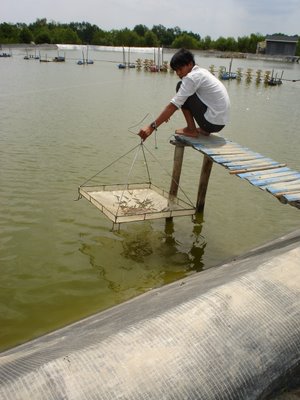
My teacher explained that the people who lived in Can Gio were the poorest in the HCMC region. You could only reach it by ferry, even though it wasn’t an island. I am not exactly sure of its geography, but know there are rivers running through it and one side there is the beach.
After we crossed the river and once more boarded the bus, we set out on a very long drive over poorly paved roads, through sparsely populated areas, and with rather bleak scenery for a good pat of the way. As we drove I asked about the shrimp business. It only started five years ago, and this year was not good because of ‘the weather’. It wasn’t until I later looked it up that I found out that the whole shrimp business was a gigantic failure.
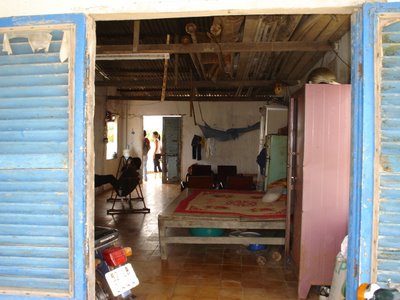
Apparently, a few people found out that you could make big bucks with shrimp, and for a year or two were quite prosperous. Others came and began to rip out the mangrove forests, which are needed to sustain the region, to build shrimp ponds. The problem was that no one really had the know-how or equipment to ensure productivity. What I saw was a denuded forest with lots of shrimp ponds, many of them empty. It was very depressing, especially after almost two hours in a bus. We did get out and visit a pond, then back on the bus, headed for the beach, and another hour or so of driving.
The next stop was at a beach resort restaurant, for lunch. It was pleasant to sit at the outdoor, covered restaurant, where we all ate and talked. The weather had greatly improved from the blistering heat of the non-producing shrimp farms, principally because of the ocean breeze. We were allowed to rest after lunch, and then it was on to the mangrove forest/monkey biosphere reserve.
It was another hour on the bus, and even though there was A/C, it still was hot and sweaty and I was wondering about why I had come. We finally started to drive past the mangroves, and they didn’t appear old, not that I knew what they should look like. I asked my teacher about it. It turns out the entire area had been a victim of Agent Orange during the war. My heart sank. How could she even talk to me, knowing my country had destroyed this ancient wilderness area? It became very hard to look out the window and not see the ghosts of war. She went on to tell me that her husband had been one of the young volunteers who came there after the war to replant the mangroves. What we were seeing was only thirty years old.
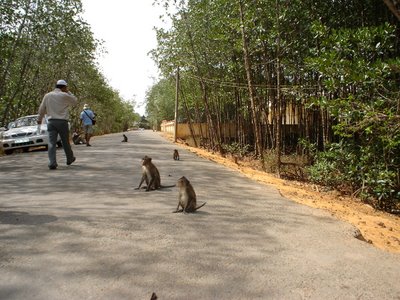
The preserve itself was just a small road off the main one. We walked in, and immediately were surrounded by cute little monkeys looking for a handout. One of the teachers warned us to be careful with anything in our hands; water bottles, cameras, etc., as the monkeys would snatch them from you. Over the next hour I would hear countless screams as people lost water bottles or had monkeys come to close for their comfort. Every park official carried a sling shot and a pocketful of rocks in case the boys got too out of hand. All the critters looked a little forlorn and lost, but I could be wrong. I was feeling none to comfortable with the stalking creatures and had visions of the Winged Monkeys of Oz.

We then filed over to the boat ramp for the ‘high speed boat ride’ through the mangroves. I certainly did not want anything high speed, and was assured they cruised at a slow pace. In groups of six, we piled into the long, low boats and took off. In an out of narrow waterways under the canopy of the trees, we rode. When a monkey started to come towards us, the boat driver shot off a rock in his direction.
A ways into this lovely forest, we docked at another park feature, a rebuilt, war era, military jungle camp. Walkways built above the water connected small huts that had been used as sleeping quarters, dining area, and other such things. It was impressive and I have no idea how anyone could ever find there way in and out of there. Had I been told to take a boat and go back to point A, I would have been lost. After a brief visit, we boarded the boats and this time it was a high speed ride, but quite fun.
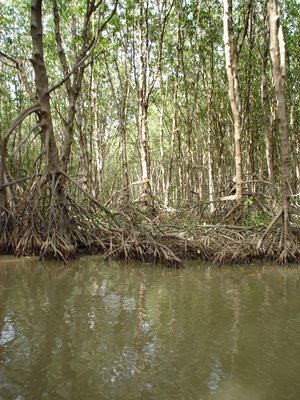
On the way back to the bus I briefly walked into the museum and didn’t stay long. It was filled with examples of flora and fauna that used to live there and, presumably, where napalmed off the face of the earth.
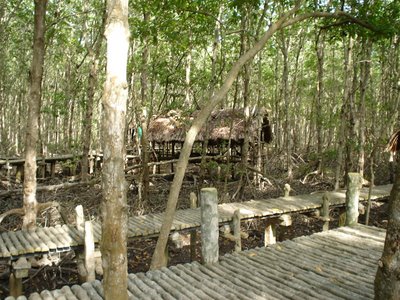
It was almost another two hours before I got home. I suppose I should say it was not the most enjoyable trip I had ever taken, but had I not gone, I would never have known. And I suppose it doesn’t hurt to gain more knowledge about the destruction of natural habitats, both past and present. At least I had a nice time taking to my teacher and some of my fellow travelers.
